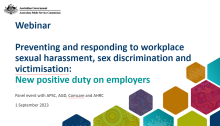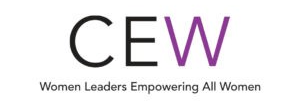Preventing and responding to sexual harassment in the APS
As a model employer, all APS agencies have a legal obligation to proactively foster respectful, safe and inclusive workplaces, in line with the positive duty under the Sex Discrimination Act 1984 (Cth). Actions to meet these obligations are reflective of government’s full commitment to legislative reforms and ongoing work to prioritise meaningful and immediate action to stop sexual harassment at work.
Legislation
Positive Duty under the Sex Discrimination Act 1984 (Cth)
Under the Sex Discrimination Act 1984 (Cth), organisations and businesses, including all APS agencies, have a positive duty to eliminate, as far as possible, the following unlawful behaviour:
- discrimination on the grounds of sex in a work context
- sexual harassment in connection with work
- sex-based harassment in connection with work
- conduct creating a workplace environment that is hostile on the grounds of sex
- related acts of victimisation.
The Anti-Discrimination and Human Rights Legislation Amendment (Respect at Work) Act 2022 (‘Respect at Work Act’) was passed by Parliament on 28 November 2022 and commenced on 13 December 2022.
This positive duty imposes a legal obligation on organisations, including APS departments and agencies, to take proactive action to prevent sexual harassment and related unlawful behaviours from occurring in the workplace, or in connection to work. Taking preventative action will help to create safe, respectful and inclusive workplaces.
This requires APS departments and agencies to actively prevent workplace sexual harassment, sex discrimination and other relevant unlawful conduct, rather than responding only after it occurs.
The positive duty was a key recommendation of the Australian Human Rights Commission’s landmark Respect@Work: National Inquiry into Sexual Harassment in Australian Workplaces Report 2020 (Respect@Work Report), led by former Sex Discrimination Commissioner Kate Jenkins AO, published in March 2020.
To ensure workplaces follow the rules of the positive duty under the Sex Discrimination Act 1984 (Cth), the Australian Human Rights Commission can conduct inquiries into organisations. Where they make a finding of non-compliance, a ‘compliance notice’ may be issued to an organisation, advising them what actions the organisation must take, or stop taking, to address the issue.
The Australian Human Rights Commission have published extensive resources about the positive duty and their powers to investigate suspected non-compliance with the positive duty on their The Positive Duty in the Sex Discrimination Act webpage.
Hear more from Dr. Anna Cody, Australia's Sex Discrimination Commissioner.
APS Commissioner’s Directions 2022
The Australian Public Service Commissioner’s Directions 2022 prescribe standards that Agency Heads and APS employees must comply with in order to meet the obligations under the Public Service Act 1999.
With regards to the obligation to take proactive action to prevent sexual harassment and related unlawful behaviours from occurring in the workplace, Agency heads should be aware that, under the Directions, they are required to:
- consult with the APS Commissioner before entering into an agreement settling a dispute with an APS employee that includes a confidentiality or non-disclosure clause if the matter relates to sexual harassment
- notify the Commissioner of all non-disclosure agreements entered into each financial year.
These arrangements ensure that there is accountability across the APS in the use of confidentiality and non-disclosure provisions in such agreements.
Additional relevant legislation
APS agencies must also meet their obligations and duties under the Work Health and Safety Act 2011 and Work Health and Safety Regulations 2011.
Please note: the Work Health and Safety (Sexual and Gender-based Harassment) Code of Practice 2025 and the Work Health and Safety (Managing Psychosocial Hazards at Work) Code of Practice 2024 have been designed to help organisations meet obligations under the Work Health and Safety Act 2011 and the Work Health and Safety Regulations 2011. Please see Comcare’s Harassment including sexual harassment webpage for further details.
APS guidance and resources
| Sexual harassment is inconsistent with APS employees’ and agency heads’ obligations under the APS Values, Employment Principles, and Code of Conduct, set out respectively in ss.10. 10A, and 13 of the Public Service Act 1999. |
Reporting sexual harassment in the APS
There are different channels for reporting incidences of sexual harassment and related unlawful behaviours depending on the outcome the employee is seeking.
For more information, refer to the Referral pathways for sexual harassment in the workplace.
APS Model Policy for the Prevention of Workplace Sexual Harassment and related unlawful conduct
The APSC’s Inclusion Policy team has developed the APS Model Policy for the Prevention of Workplace Sexual Harassment and related unlawful conduct for use by Human Resources, Diversity & Inclusion and Work Health and Safety practitioners across Australian Public Service (APS) agencies.
This resource is intended for use by APS agencies as an example that can be tailored to specific agency workforce requirements, work environments and workforce profile and composition.
Each APS agency is responsible for ensuring obligations are met in relation to the Work Health and Safety Act 2011 and the Sex Discrimination Act 1984 (Cth), and any other relevant Commonwealth and State and Territory legislative requirements.
Please email the Inclusion Policy team at diversity@apsc.gov.au with any questions about the APS Model Policy for the Prevention of Workplace Sexual Harassment and related unlawful conduct.
Download the APS Model Policy for the Prevention of Workplace Sexual Harassment and related unlawful conduct.
Please note: The APS Model Policy has yet to be updated to reflect the new Work Health and Safety (Sexual and Gender-based Harassment) Code of Practice 2025.
Webinar on Preventing and responding to workplace sexual harassment, sex discrimination and victimisation: New positive duty on employers

The APSC webinar on Preventing and responding to workplace sexual harassment, sex discrimination and victimization: New positive duty on employers which was held on 1 September 2023. Presenters from the APSC, the Attorney-General’s Department, Comcare and the Australian Human Rights Commission discussed the ongoing prevention and response to sexual harassment and related unlawful conduct within the APS, and the new positive duty obligations under the Sex Discrimination Act 1984 (Cth).
Training

- APS Academy’s Sex Discrimination and Positive Duty learning webpage.

- Comcare’s Training and Learning webpage.
Key information and resources

- The Positive Duty in the Sex Discrimination Act webpage.
- Speaking from Experience project.
- Speaking from Experience media release, 25 June 2025.
- Speaking from Experience: What needs to change to address workplace sexual harassment, June 2025 report.
- Workplace Sexual Harassment Resources webpage.

- Safe Work Australia’s Code of Practice:How to Manage Work Health and Safety Risks.
- Safe Work Australia’s Code of Practice: Work Health and Safety Consultation, Co-operation and Co-ordination.
- Safe Work Australia’s Managing Risks – Workplace sexual harassment webpage.
- Safe Work Australia’s Model Code of Practice: Managing psychosocial hazards at work | Safe Work Australia.
- Safe Work Australia’s Code of Practice: Managing the work environment andfacilities (includes remote and isolated work).
- Safe Work Australia’s Remote and isolated work - Managing risks | Safe Work Australia.

- Comcare’s Referral pathways for sexual harassment in the workplace: a guide for employers in the Comcare scheme.
- Comcare Harassment including sexual harassment webpage.
- Comcare Fact Sheet Risk Management: A Snapshot
- Comcare Preventing harm and injury at work webpage.
- Comcare’s Workplace Sexual Harassment: Regulatory guidance for employers on their work health and safety responsibilities.
- Model Code of Practice: How to manage work health and safety risks, 2024.
- Comcare’s Workplace sexual harassment: Practical Guidance for Managers and Supervisors.
- Comcare Remote or isolated work | Comcare.

- Chief Executive Women Resources & Toolkits webpage.
- Chief Executive Women’s CEW Respect is Everyone’s Business Resource Pack includes example wording and example mitigation measures.

- Champions of Change Coalition’s Disrupting the System – Sexual Harassment: Practical resources and tools. This resource includes an example workplace sexual harassment policy document.



